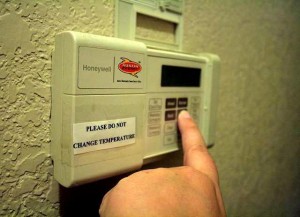Cooler Summer Bites Into Public Utility Revenues
Aside from the month of August, this summer has been relatively cool as far as Texas summers go. That’s a welcome change of pace for those who live here, but it’s brought an unanticipated gap in revenue for some electricity providers.
Take Austin Energy. At the start of the year, the city-owned utility was expecting to bring in around $654 million in base revenue from energy used by customers. Since then, it has reduced that estimate by about $16.5 million.
“That’s the impact the cooler weather has had. It’s to the tune of 16 and a half million,” says Carlos Cordova, a spokesperson for Austin Energy.
The utility makes 40 percent of its annual revenue in the four hottest months of the year that’s June, July August and September. This year all those months, except August, have seen lower than average AC use and peak electric demand.
“This is even statewide. The Electric Reliability Council of Texas had been projecting a peak demand of about 68,000 megawatts and it’s just a little bit more than 66,000 and this cooler temperature was seen throughout the a state and almost throughout the entire country,” Cordova says.
One temperate summer isn’t something that would normally be a big deal, but for some utilities it’s coming after years of shrinking revenue, says Ryan Green of the Fitch Ratings, an international credit-ranking agency.“I think a lot of it started with the recession where folks in a great part of the country were under stress financially and in response to that a lot of utilities wanted to soften the burden as much as possible and that meant not raising rates,” say Greene.
The long term trend is prompting Fitch to encourage some publicly owned utilities to consider rate hikes, lest their credit ratings suffer from the decline in revenue.
“When revenues are down be it for weather, economics, whatever it may be. We really look to (…) public power utilities’ autonomous rate setting authority in order to protect financial margins,” says Greene.
Greene says utilities that raised rates during the recession would be better positioned to weather a few cooler summers. That’s something Austin Energy staff says it’s already done.
In response to an email, spokespersons Cordova pointed out that Austin Energy raised rates in 2012. Before then, he said, the utility had gone about 18 years without a rate hike. “That was not looked at favorably by the rating agencies” wrote Cordova, “But that’s behind us now.”


